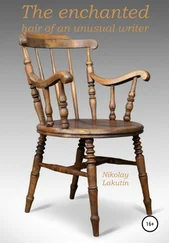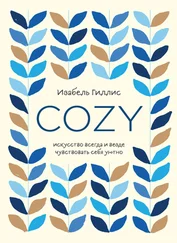“I see.” St. Just regarded him. Something George was telling him, he felt, was important to the case, but he couldn’t think for the moment what it could be.
“Did you see your father often?”
George hesitated slightly before answering. St. Just detected the familiar indecision of an interviewee debating whether or not telling the truth were the best course.
“Not often,” said George. “No more often than the others.”
St. Just nodded in Fear’s direction, a nod that told Fear to put a mark by that statement for later verification. Ostentatiously, Fear licked his pencil and drew several big stars on the page. As if suddenly realizing Mrs. Romano would surely be able to put the lie to his statement, George amended:
“Oh, fairly often, I suppose, in recent years. It depends on what you mean by often.”
“You tell me, sir,” said St. Just. Sergeant Fear noticed the familiar frown forming, the one that could make St. Just’s eyes nearly disappear beneath his brows. Young George here, he felt, would do well to notice it, too.
“I made rather a determined policy to stay in his good graces, that’s all. I think the old man was lonely. It rather explains this stupid marriage, doesn’t it?”
“The marriage acted as some kind of catalyst, didn’t it? You must feel as I do that none of this would have happened but for the marriage?”
Dishonesty having failed as a policy, George made a further attempt at open frankness.
“It was part of his usual shock treatment. But we were used to it, Inspector. In a way. ‘Numbed by it’ might be a better expression.
Isn’t there an animal that eats its young? Being around him-it was like that for all of us, except Ruthven, perhaps.”
“There were bad feelings between you and Ruthven because of this-competition-your father encouraged between you.”
It was a statement rather than a question.
“There were no feelings at all, Chief Inspector. I tell you, we were simply numbed by it. Ruthven might be on top one year, but it was simply a matter of waiting my turn to catch the King’s eye.”
After fifteen minutes in which George reiterated his indifference, and his alibi for Ruthven’s murder-none of them had a verifiable alibi for the time of Sir Adrian’s death-they left George preening before a mirror.
“Alibis are a two-way street,” said Sergeant Fear as he shut the door, just loudly enough to be sure George could hear.
“With a roundabout in the middle,” said St. Just. “Yes, I realize that if George and Natasha are both lying for each other about being together, it means both have no alibi for Ruthven’s murder at all. I am glad to see you were paying close attention during your interrogation training.”
They walked farther down the hall, pausing near an alcove holding a dusty stuffed crocodile, jaws ajar, in a glass display case. St. Just shuddered and turned away.
“Interesting morsel of information about the title,” he said. “Perhaps Sir Adrian was an even bigger phony than George had sussed.”
“St. Drudmilla’s, you mean.”
“Yes. You and I know now that Sir Adrian was raised in an orphanage- the place Coffield mentioned to me-so we can discount the part of Sir Adrian’s novel where the sensitive young boy left his family behind in Wales. Looks like it was the other way around-someone abandoned him -and it was still very much a sore spot. Since St. Drudmilla’s is a home for unwed mothers, he must have flat-out purchased the title in an even dodgier deal than George believes. I doubt ‘Sir Adrian,’ as we may as well continue to call him, could have learned of some remote blood tie to the Beauclerk-Fisks-the 1976 Adoption Act hadn’t been passed at the time. How did he manage it? Forged documents-had to be. In any event, he was willing to tell the truth about other people’s secrets, but he still couldn’t bring himself to come entirely clean about his origins. He’d look a fool after so many years of passing himself off as to the manor born.
“More than that, I think that coming from a poor background was one thing, but being born on the wrong side of the sheets, to someone of his generation, was another. He would have wanted to take that one secret to his grave.”
Sergeant Fear shook his head in disbelief.
“Who would care, in this day and age?”
“Sir Adrian, apparently. No wonder he felt that nothing would do but that Natasha and George had to get married, and the sooner the better. Well, what next? The lady of the house, I think.”
***
They found her in the sitting room that separated her bedroom from Sir Adrian’s, flipping through a fashion magazine as thick as a telephone directory. Perhaps she felt the occasion of the murder of her new husband called for a freshening of her wardrobe.
She looked up and smiled wanly. There were signs of strain around her eyes, perhaps a smudge of shadow beneath that hadn’t been there before, along with a fine etching of wrinkles, but she was remarkably composed for someone who had sustained such a shock. Her hair was pulled back in the gleaming black, sleek chignon that was apparently her trademark, her lips were carefully lined in dark red, and she wore a dress of soft, dove-gray wool. Perhaps there were degrees and shades of mourning, and pale gray was the best she could manage.
St. Just greeted her and accepted her invitation to sit down. Sergeant Fear took up a position at the window, apparently just watching snow melt against the panes, but listening closely.
“According to Mrs. Romano, you and Sir Adrian were together in his study before he died. But according to our examiners, he was dead well before five, when she heard you in there together. Can you explain the discrepancy?”
“Quite easily. Mrs. Romano is either lying or she is mistaken.”
“You claim you were not in Sir Adrian’s study the afternoon or evening that he died?
“I was not, Inspector,” she said flatly. “Adrian in his study was like a tribal chief in his hut. It was well understood by all that he was not to be disturbed, without permission, which I gather was seldom granted. If he wanted to see anyone, he commanded them into his presence. One did not just casually drop in.”
“Even his wife?”
“Rules of the house. I was no exception, Inspector. Mrs. Romano was granted more leeway than most. She’s been around since the last ice age, and seems to think she owns the place. Perhaps she has her own reasons for implicating me. Not the first time, as you must know by now, that I’ve been in that position.”
“Your first husband-”
“Was murdered. Yes. But not by me.”
Suddenly she smacked the magazine down on the table in front of her, looking straight at him.
“Not by me,” she repeated. “Let me tell you, Chief Inspector, something about Winnie Winthrop and myself, since you’re so curious: No matter what you read or hear, or what you choose to believe, that was a love match. He was rich and I was young. People put two plus two together and came up with four, or so they thought. But I can tell you Winnie was the kindest man who ever lived. Anyone would tell you the same. Also, they would tell you I was devoted to him. He was my best friend, Inspector. I trusted and respected him. To my astonishment, he felt the same, for which I will always be grateful to whatever God allowed me that brief time of happiness. I simply adored the man. Do you have any idea how rare that is, for two people to feel that way about each other?”
St. Just, long a widower, said quietly, “I have some idea. Yes.”
“No one else has ever taken his place for me. No one.”
“Not even Sir Adrian?”
She laughed.
“Especially not Sir Adrian.”
His face must have registered his surprise.
Читать дальше
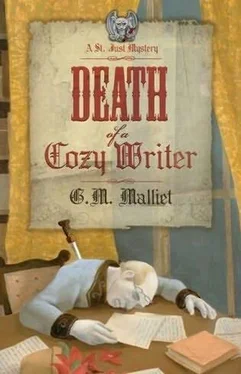
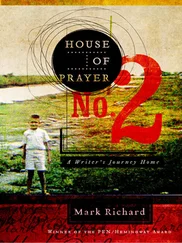


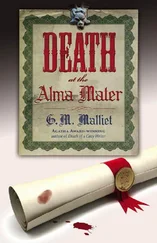


![Изабель Гиллис - Cozy. Искусство всегда и везде чувствовать себя уютно [litres]](/books/406910/izabel-gillis-cozy-iskusstvo-vsegda-i-vezde-chuvs-thumb.webp)
